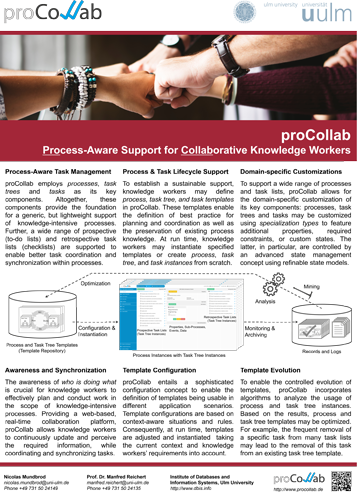proCollab - Process-aware Support for Collaborative Knowledge Workers
Motivation
Knowledge-intensive processes (KiPs) have become the centerpiece for creating value in highly developed countries. Well-known KiPs are, e.g., automotive engineering projects, patient treatment cases, software development projects, research projects, or police investigations.
However, the proper operational support of KiPs constitutes a big challenge. As KiPs are emergent and unpredictable by nature, they are driven by knowledge workers utilizing their skills, experiences and expertise at run time. KiPs cannot be pre-specified like routine processes a priori and traditional process-oriented approaches just fail. In particular, for coordinating and synchronizing their work, knowledge workers rely on task lists, such as to-do lists, task sheets, or checklists.
Though these means are intuitive and prevalent, their current implementations are highly ineffective and error-prone. In addition, no lifecycle support is provided and media disruptions aggravate task management in the scope of KiPs. As a result, knowledge workers spend much time for inefficient and redundant work as their efforts are not preserved and exploited for optimizing future KiPs.
proCollab in a Nutshell
The proCollab (process-aware Support for Collaborative Knowledge Workers) approach was developed to establish a generic, lightweight and lifecycle-based task management support for KiPs. In this context, the approach is capable to provide customizable coordination support for a wide range of KiPs in the shape of projects, cases or investigations. Further, all kind of prospective (to-do lists) and retrospective task lists (checklists) are supported to enable better task coordination and synchronization within the knowledge-intensive processes.
Lifecycle-based Task Management Support for Knowledge-intensive Processes
As a foundation, proCollab employs processes, task trees and tasks as its key components. To establish the required lifecycle-based support, knowledge workers may define process, task tree, and task templates in proCollab. These templates enable the definition of best practice for planning and coordination as well as the preservation of existing process knowledge. At run time, knowledge workers may instantiate specified templates or create process, task tree, and task instances from scratch.

Domain-specific Customizations
To support a wide range of processes and task lists, proCollab allows for the domain-specific customization of its key components: processes, task trees and tasks may be customized using specialization types to feature additional properties, required constraints, or custom states. The latter, in particular, are controlled by an advanced state management concept using refinable state models.
Awareness and Synchronization
The awareness of who is doing what is crucial for knowledge workers to effectively plan and conduct work in the scope of KiPs. Providing a web-based, real-time collaboration platform, proCollab allows knowledge workers to continuously update and perceive the required information, while coordinating and synchronizing tasks
Template Configuration
proCollab additionally entails a sophisticated configuration concept to enable the definition of templates being usable in different application scenarios. Template configurations are based on context-aware situations and rules. Consequently, at run time, templates are adjusted and instantiated taking the current context and knowledge workers’ requirements into account.
Template Evolution
To enable the controlled evolution of templates, proCollab incorporates algorithms to analyze the usage of process and task tree instances. Based on the results, process and task tree templates may be optimized. For example, the frequent removal of a specific task from many task lists may lead to the removal of this task from an existing task tree template.
proCollab Prototype
To prepare emprical studies and to validate feasibility, we developed a sophisticated proof-of-concept prototype. It is realized with Java EE 7 and relies on a multi-layer architecture (cf. Figure 2) based on the Model–View–Controller design pattern. The application logic layer represents the core of the prototype realizing the key services of the proCollab approach and its key components. The RESTful interface enables web and mobile applications to communicate with the services. In particular, this includes the synchronized presentation of the proCollab components across connected clients. Hence, the user interface of the web application (cf. Figure 2) enables knowledge workers to collaboratively manage their projects or cases (i.e., proCollab processes) including task trees in the shape of, e.g., to-do lists and checklists.
To illustrate the proof-of-concept prototype, we prepared a screencast available on vimeo. It is also embedded on the right column of this page.

Project Details

Project Team
 | Ulm University, Institute of Databases and Information Systems |
 | Ulm University, Institute of Databases and Information Systems |
 | Ulm University, Institute of Databases and Information Systems |
Project Partners
Ulm University, Institute of Databases and Information Systems
proCollab Prototype Demo
Involved Students
Bachelor Theses:
- Sabrina Geiger
- Matthias Gerber
- Bianka Hampp
- Andreas Köll
- Daniel Reich
- Simon Stöferle
- Norman Thiel
- Enrico Weigelt
- Jule Ziegler
Master Projects:
- Florian Beuter
- James Diesenbacher
- Matthias Gerber
- Michael Lamp
- André Lang
- Florian Lutz
- Ekaterina Molokova
- Jan Sellner
- Simon Stöferle
Master & Diploma Theses:
- Florian Beuter
- Matthias Gerber
- David Langer
- Nicolas Mundbrod
- Bettina Nowak
- Christoph Rothermel
Duration
The proCollab project has been running since summer 2012.

